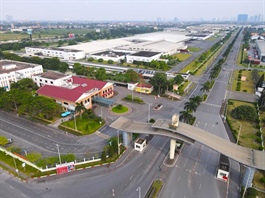SBV will continue providing capital for real estate sector
SBV will continue providing capital for real estate sector
Deputy Governor of the State Bank of Vietnam Dao Minh Tu has clarified that the bank has not restricted real estate loans, contrary to reports.

He made the comments on February 8 at the Real Estate Credit Conference presided over by the State Bank of Vietnam (SBV) and the Ministry of Construction.
Tu said that the SBV only provided directives to carefully restrict credit risk in certain high-risk locations and segments of the real estate industry. "For instance, speculation and huge segment business leading to freezes and bubbles, which impact the system," he said.
In essence, the SBV constantly analyses real estate credit trends and implements monetary and credit policies with the objectives of guaranteeing the security of the banking system, contributing to economic growth, and ensuring the market's sustainable development, he said.
“I would like to clarify that SBV has not received any papers or declarations about the restriction of real estate credit. To protect the integrity of the system, credit should be rigorously regulated for some vulnerable sectors, such as those with a high rate of speculation. Up to this point, we have maintained the same guiding stance. As in other industries, credit for genuine home buying reasons is equally assured,”Dao Minh Tu, Deputy Governor of the SBV.
Ha Thu Giang, deputy director of the Credit Department for Economic Sectors at the SBV, said that bond purchases in the real estate market originate from a wide range of sources, including listed companies' own equity, advance capital from property investors, capital for issuing stocks and bonds, private investment capital from international investors, and commercial bank capital.
For the banking sector, market trends and company issues have a direct influence on credit quality and macroeconomic stability.
According to the SBV, unsettled real estate credit will reach approximately $109 billion by the end of 2022, representing a 24.27 per cent annual increase.
This is one of the fastest-growing industries, accounting for 21.2 per cent of all outstanding loans to the economy, the highest level in the last five years.
The real estate business climbed by 11.5 per cent, accounting for 31.28 per cent of the rise, while the client credit balance increased by 31.1 per cent, accounting for 68.72 per cent of the increase.
By section, outstanding home loans accounted for 62.19 per cent, land use rights for 20.66 per cent, industrial and export processing zones 2.67 per cent, meeting houses 0.71 per cent, and others 13.79 per cent.
It is evident that financial institutions continue to provide credit to the real estate sector, notwithstanding rapid expansion and substantial loan balances. In accordance with the rules, credit institutions must make loans for viable projects and lending plans.
In addition, the SBV stressed that it would continue to conduct monetary policy firmly, aggressively, flexibly, and synchronously with fiscal policy and other macroeconomic measures in the future.
In addition, improving the legislative framework on credit and banking operations in line with the existing circumstances is necessary to establish favourable conditions for individuals and companies to obtain credit and eliminate real estate challenges.
In addition, the SBV intends to instruct financial institutions to manage credit risk for the high-end real estate sector, which is experiencing excess supply, trading speculatively, price fixing, and manipulating the market. Additionally, it will manage the extent of credit consolidation for a few big customers, consumers associated with key shareholders, and related individuals of shareholders of credit institutions.
It will also secure the safety of banking operations.





















